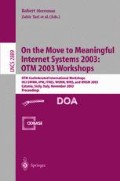Abstract
Organizations use process mapping as a basic tool to define or analyze how they manage their business. Process mapping methodologies are also used to design better business processes, to improve efficiency and foster productivity and output quality, while reducing business risks. Process maps are usually developed by business analysts and process engineers, which are often highly centralised knowledge resources and generally apply process mapping methodologies based on top down approaches. Business analysts are used to represent process maps using flowcharting tools, or, in case of database supported knowledge bases, using tree-shaped structures. Unfortunately, top-down approaches and both flowchart-based or tree-shaped process knowledge bases lead to process maps which are mainly unable to represent in a complete manner the enterprise knowledge about its processes and generally hinder the sharing and the subsequent reuse of the process maps. In this article we illustrate an alternative approach to represent process maps and business knowledge, based on typical concepts and methodologies from the Semantic Web paradigm (i.e. ontologies, XML based languages and agents), and aimed to allow for the production of complete, meaningful and reusable process maps.
Access this chapter
Tax calculation will be finalised at checkout
Purchases are for personal use only
Preview
Unable to display preview. Download preview PDF.
References
Mayer, R.J., de Witte, P.S.: Delivering Results: Evolving BPR from art to Engineering (1998)
Klauck, C., Müller, H.J.: Formal Business Process Engineering based on Graph Grammars (1996)
Fox, M.S., Grüninger, M.: Ontologies for Enterprise Integration (1994)
Guarino, N.: The role of ontologies for the Semantic Web, Semantic Web Tour, Rome (2003), http://www.w3c.it/events/st/guarino.pdf
Fensel, D., Bussler, C., et al.: Semantic Web Application Areas (2002)
Cranefield, S.: Networked Knowledge Representation and Exchange using UML and RDF. Journal of Digital Information 1(8) (2001)
Resource Description Framework (RDF) Model and Syntax Specification, W3C Recommendation, February 22 (1999), http://www.w3.org/TR/REC-rdf-syntax
Resource Description Framework (RDF) Schema Specification, W3C Proposed Recommendation, March 3 (1999), http://www.w3.org/TR/PR-rdf-schema/
Author information
Authors and Affiliations
Editor information
Editors and Affiliations
Rights and permissions
Copyright information
© 2003 Springer-Verlag Berlin Heidelberg
About this paper
Cite this paper
Fresco, R., Pederiva, A. (2003). An Approach to the Process Maps Based on Semantic Web Methodologies. In: Meersman, R., Tari, Z. (eds) On The Move to Meaningful Internet Systems 2003: OTM 2003 Workshops. OTM 2003. Lecture Notes in Computer Science, vol 2889. Springer, Berlin, Heidelberg. https://doi.org/10.1007/978-3-540-39962-9_22
Download citation
DOI: https://doi.org/10.1007/978-3-540-39962-9_22
Publisher Name: Springer, Berlin, Heidelberg
Print ISBN: 978-3-540-20494-7
Online ISBN: 978-3-540-39962-9
eBook Packages: Springer Book Archive

